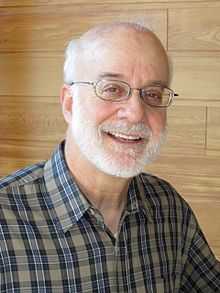Ronald Fagin
| Ronald Fagin | |
|---|---|
 Ronald Fagin | |
| Born |
1945[1] Oklahoma City, OK, USA |
| Residence | Los Gatos, California |
| Nationality | American |
| Fields |
Logic in Computer Science, Database theory, Finite model theory, Rank and score aggregation, Reasoning about knowledge |
| Institutions | IBM Almaden Research Center |
| Alma mater |
Dartmouth College, University of California, Berkeley |
| Doctoral advisor | Robert Lawson Vaught |
| Known for | Fagin's theorem |
| Notable awards | Gödel prize (2014) |
Ronald Fagin (born 1945) is an American computer scientist and IBM Fellow at the IBM Almaden Research Center. He is best known for his pioneering work in database theory, finite model theory, and reasoning about knowledge.[2]
Biography
Ron Fagin was born and grew up in Oklahoma City, where he attended Northwest Classen High School. Following that, he completed his undergraduate degree at Dartmouth College. Fagin received his Ph.D. in Mathematics from the University of California, Berkeley in 1973, where he worked under the supervision of Robert Vaught.
He joined the IBM Research Division in 1973, spending two years at the Thomas J. Watson Research Center, and then transferred in 1975 to what is now the IBM Almaden Research Center in San Jose, California.
He has served as program committee chair for ACM Symposium on Principles of Database Systems 1984,[3] Theoretical Aspects of Reasoning about Knowledge 1994,[4] ACM Symposium on Theory of Computing 2005,[5] and the International Conference on Database Theory 2009.[6]
Fagin has received numerous professional awards for his work. He was elected Member of the National Academy of Engineering, American Academy of Arts and Sciences, IBM Fellow, ACM Fellow, IEEE Fellow, and Fellow of the American Association for the Advancement of Science. He won the 2014 Gödel Prize and he received a Docteur Honoris Causa from the University of Paris. The IEEE granted him the IEEE W. Wallace McDowell Award and the IEEE Technical Achievement Award;[7] the ACM the ACM SIGMOD Edgar F. Codd Innovations Award[8] and IBM Eight IBM Outstanding Innovation Awards, Two IBM supplemental Patent Issue Awards, given for key IBM patents, the IBM Outstanding Technical Achievement Award, and the IBM Corporate Award. Fagin is listed among the "Highly Cited Researchers."[9] He won Best Paper awards at the 1985 International Joint Conference on Artificial Intelligence, the 2001 ACM Symposium on Principles of Database Systems, and the 2010 International Conference on Database Theory. He won 10-year Test-of-Time Awards at the 2011 ACM Symposium on Principles of Database Systems, the 2013 International Conference on Database Theory, and the 2014 ACM Symposium on Principles of Database Systems.
Work
Fagin's theorem
Fagin's theorem, which he proved in his PhD thesis, states that existential second-order logic coincides with the complexity class NP in the sense that a decision problem can be expressed in existential second-order logic if and only if it can be solved by a nondeterministic Turing machine in polynomial time. This work was seminal to the area of finite model theory.[10]
Other contributions
Another famous result that he proved (1976) is that first-order logic has a zero-one law, a tool for proving inexpressibility results for database query languages.[11] In fact this result was proved independently by Glebskiĭ et al. earlier (1969) in Russia.[12]
He is also known for his work on higher Normal Forms in Database Theory, particularly 4NF.
Publications
Fagin has authored and co-authored many publications in his fields of expertise.[13][14] Books, a selection:
- Fagin, Ronald, Joseph Y. Halpern, Yoram Moses, and Moshe Y. Vardi. Reasoning about knowledge. MIT press (1995). Paperback edition (2003).
Articles, a selection:
- Fagin, Ronald. "Generalized first-order spectra and polynomial-time recognizable sets". Complexity of Computation, ed. R. Karp, SIAM-AMS Proceedings, Vol. Vol. 7 (1974):43-73.
- Fagin, Ronald, Jurg Nievergelt, Nicholas J. Pippenger, and H. Raymond Strong. "Extendible hashing—a fast access method for dynamic files." ACM Transactions on Database Systems (TODS) 4.3 (1979): 315-344.
- Fagin, Ronald. "Combining fuzzy information from multiple systems." Journal of Computer and System Sciences 58 (1999): 83-99. (Special issue for selected papers from the 1996 ACM Symposium on Principles of Database Systems).
- Fagin, Ronald, Amnon Lotem, and Moni Naor. "Optimal aggregation algorithms for middleware." Journal of Computer and System Sciences 66 (2003): 614-656. (Special issue for selected papers from the 2001 ACM Symposium on Principles of Database Systems).
- Fagin, Ronald, Phokion Kolaitis, Renee J Miller, and Lucian Popa. Data exchange: semantics and query answering, Theoretical Computer Science 336 (2005): 89-124. (Special issue for selected papers from the 2003 International Conference on Database Theory).
References
- ↑ American Men and Women of Science, Thomson Gale, 2004.
- ↑ Reasoning about Knowledge. Co-authors J.Y. Halpern, Y. Moses and M.Y. Vardi. Published by MIT Press, 1995. Paperback edition, 2003.
- ↑ ACM Symposium on Principles of Database Systems 1984
- ↑ Theoretical Aspects of Reasoning about Knowledge 1994
- ↑ Symposium on Theory of Computing 2005
- ↑ International Conference on Database Theory 2009
- ↑ IEEE Technical Achievement Award
- ↑ ACM SIGMOD Edgar F. Codd Innovations Award
- ↑ Institute for Scientific Information Highly Cited Researchers
- ↑ Neil Immerman, Descriptive Complexity. Springer-Verlag, 1999
- ↑ Ronald Fagin: Probabilities on Finite Models. Journal of Symbolic Logic, 41(1):50-58, 1976
- ↑ Y.V. Glebskiĭ, D.I. Kogan, M.I. Liogonkiĭ, and V.A. Talanov: Range and degree of realizability of formulas in the restricted predicate calculus. Kibernetika, 2:17-28, 1969
- ↑ Ronald Fagin: IBM Almaden Research Center Google Scholar profile
- ↑ Ronald Fagin The DBLP Computer Science Bibliography
External links
| ||||||
|